Comprehensive Guide to Garden Maintenance in Kentish Town
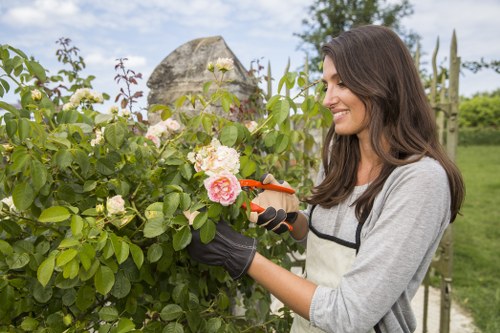
Gardening in Kentish Town offers a unique blend of urban charm and green tranquility. Whether you’re a seasoned gardener or a beginner, maintaining a beautiful garden in this bustling area requires careful planning and dedication. This guide covers essential tips and strategies to keep your garden thriving year-round.
Understanding the local climate is crucial for successful garden maintenance. Kentish Town experiences a temperate maritime climate, characterized by mild winters and cool summers. This means selecting plants that can withstand these conditions is vital for a lush and vibrant garden.
Soil health plays a significant role in garden maintenance. Conducting a soil test can help determine its pH level and nutrient content, allowing you to amend it accordingly. Healthy soil promotes strong plant growth and reduces the risk of diseases.
Planning Your Garden

Designing Your Space
Effective garden design starts with a well-thought-out plan. Consider the layout, plant selection, and the overall aesthetic you wish to achieve. Incorporate elements like pathways, seating areas, and focal points to enhance the visual appeal.
Selecting the right plants is essential for a thriving garden. Opt for a mix of perennials, annuals, shrubs, and trees that complement each other and suit the local climate. Native plants are often a great choice as they are well-adapted to the environment and require less maintenance.
Utilizing vertical gardening techniques can maximize space, especially in urban settings like Kentish Town. Trellises, hanging pots, and wall-mounted planters are excellent options for growing herbs, flowers, and even vegetables.
Seasonal Garden Care
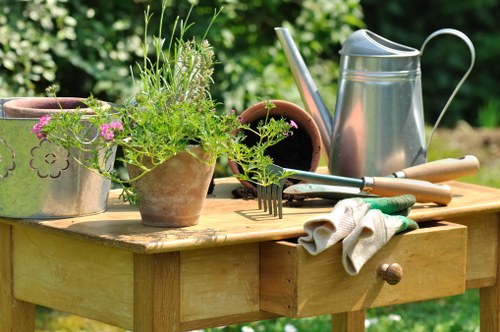
Spring Maintenance
Spring is a critical time for garden maintenance. Start by cleaning up any debris from the winter months. Prune dead or damaged branches and prepare your beds by adding compost or mulch to enrich the soil.
Planting spring-flowering bulbs such as tulips, daffodils, and crocuses can add vibrant colors to your garden. It’s also an ideal time to sow seeds for vegetables like peas, lettuce, and carrots.
Regular watering is essential as plants begin to grow. Ensure your irrigation system is functioning correctly or set up a watering schedule to keep your garden hydrated.
Weed and Pest Control
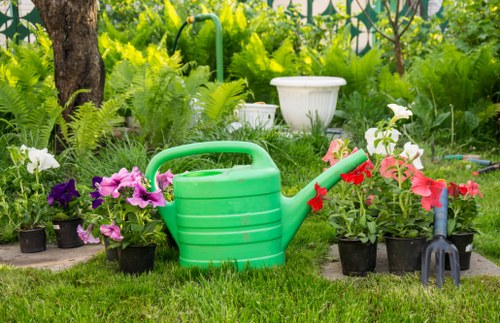
Effective Weed Management
Weeds can quickly overrun your garden, competing with your plants for nutrients and water. Implementing a regular weeding schedule helps keep them under control. Mulching is another effective method to suppress weed growth and retain soil moisture.
Hand-pulling weeds is a sustainable and eco-friendly approach, especially in smaller gardens. For larger areas, consider using organic or chemical weed killers, ensuring they are safe for your intended plants.
Integrating ground covers and dense planting can naturally reduce weed proliferation by limiting available space for weeds to grow.
Pruning and Trimming
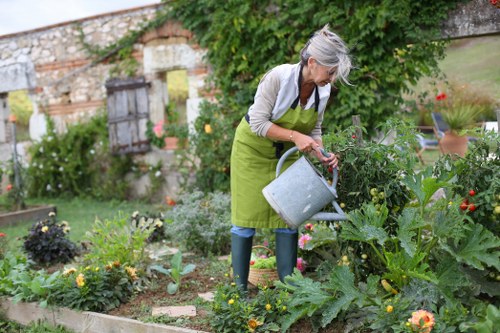
Maintaining Plant Health
Regular pruning and trimming are essential for the health and aesthetics of your garden. Removing dead or diseased branches prevents the spread of pests and encourages new growth. It also helps maintain the desired shape and size of your plants.
Different plants require different pruning techniques. For instance, fruit trees benefit from annual pruning to produce better yields, while flowering shrubs may need selective trimming to promote blooming.
Ensure you use the right tools, such as sharp shears and saws, to make clean cuts that minimize damage to the plants.
Watering and Irrigation
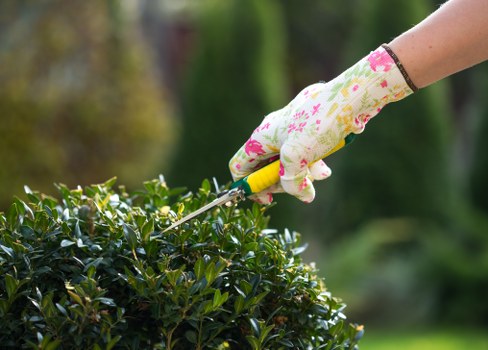
Efficient Water Management
Proper watering is vital for garden maintenance. Overwatering can lead to root rot and other issues, while under-watering can stress plants and stunt growth. Understanding the specific water needs of your plants helps in achieving the right balance.
Installing an efficient irrigation system, such as drip irrigation or soaker hoses, can save water and ensure consistent moisture levels. Timers can automate the process, reducing the need for manual watering.
Rainwater harvesting is an eco-friendly option to supplement your watering needs. Collecting rainwater can reduce reliance on tap water and promote sustainable gardening practices.
Fertilizing Your Garden
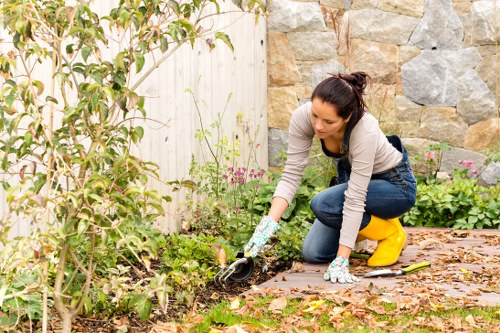
Boosting Plant Nutrition
Fertilizing provides essential nutrients that plants need to grow and thrive. Use organic fertilizers like compost, manure, or bone meal to enrich the soil naturally. Chemical fertilizers can be used, but it’s important to follow the recommended dosage to avoid over-fertilization.
Different plants have varying nutritional requirements. Leafy vegetables might benefit from high-nitrogen fertilizers, while flowering plants may require more phosphorus to support blooming.
Regularly amending the soil with fertilizers ensures that your plants receive a steady supply of nutrients throughout the growing season.
Mulching Techniques

Benefits of Mulching
Mulching offers numerous advantages for garden maintenance. It helps retain soil moisture, suppresses weed growth, and regulates soil temperature. Organic mulches, such as bark, straw, or compost, also improve soil structure as they decompose.
Applying mulch around your plants can protect roots from extreme temperatures and reduce the need for frequent watering. It also adds a neat and finished look to your garden beds.
Ensure mulch is applied evenly and kept a few inches away from plant stems to prevent moisture-related diseases.
Composting and Soil Health
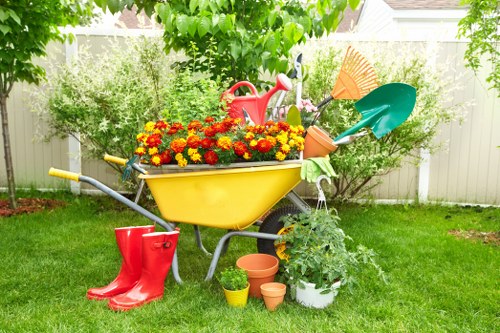
Creating Rich Compost
Composting is an effective way to recycle garden waste and kitchen scraps into valuable organic matter. A well-maintained compost pile provides nutrient-rich soil that enhances plant growth and soil health.
Balance green materials (like grass clippings and vegetable scraps) with brown materials (such as dry leaves and straw) to ensure proper decomposition. Turn the pile regularly to aerate it and speed up the composting process.
Using compost in your garden improves soil fertility, structure, and its ability to retain moisture, leading to healthier and more resilient plants.
Lawn Care Essentials
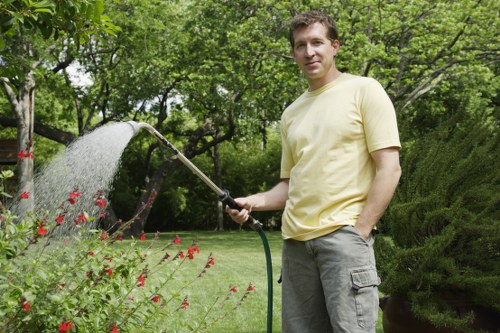
Maintaining a Healthy Lawn
A well-maintained lawn adds beauty and value to your garden. Regular mowing, watering, and fertilizing are key components of effective lawn care. Mow your lawn to the appropriate height to promote dense growth and prevent weed invasion.
Proper watering techniques, such as deep and infrequent watering, encourage deep root growth and increase drought resistance. Avoid watering during the hottest part of the day to reduce evaporation.
Fertilize your lawn according to the specific needs of the grass type. This ensures it receives the necessary nutrients for robust growth and vibrant color.
Seasonal Planting Calendar
Planning Throughout the Year
Having a seasonal planting calendar helps in organizing garden tasks and ensuring timely planting and maintenance. In spring, focus on planting new flowers and vegetables. Summer requires consistent watering and pest control, while autumn involves preparing the garden for winter by clearing debris and planting hardy species.
Winter is a time for planning and ordering seeds for the next growing season. Protect sensitive plants from frost by using mulches or covers.
Following a seasonal calendar ensures your garden remains healthy and productive throughout the year, adapting to the changing climate conditions of Kentish Town.
Conclusion
Maintaining a garden in Kentish Town is a rewarding endeavor that enhances your living space and provides a peaceful retreat from urban life. By following these comprehensive maintenance tips and strategies, you can cultivate a beautiful and thriving garden all year round.
Remember, successful garden maintenance requires patience, consistency, and a willingness to learn and adapt. With the right approach, your garden can flourish and become a source of joy and pride.
Ready to transform your garden? Contact us today to schedule professional garden maintenance services tailored to your needs.